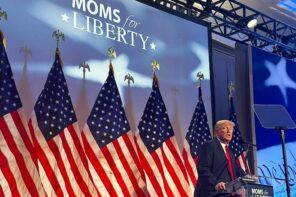Audience reactions at GOP debates have been talked about almost as much as the candidates’ performances themselves. Last night, the audience booed a gay soldier who asked, via YouTube, whether the candidates would seek to reinstate Don’t Ask Don’t Tell.
Offering his version of an answer, Rick Santorum not only made clear that he thinks that no one in the military should have sex, but that the end of DADT meant that “we are going to recognize a group of people and give them a special privilege.”
What that special privilege is, exactly, Santorum didn’t say. A special privilege to have sex when straight soldiers should not?
In any case, Santorum’s sheds light on Michele Bachmann’s non-answer to what at first blush appears to be a completely different question: the separation of church and state.
Just before she played the clip of Stephen Hill’s question for Santorum, Fox News’ Megyn Kelly asked Bachmann:
In 2006, you said that public schools are, quote, “teaching children that there is separation of church and state,” and said, quote, “I am here to tell you that’s a myth.”
Do you believe that there is a limit…
(APPLAUSE)
… on government’s ability to inject religion into the public square? And if so, what is that limit?
BACHMANN: Well, I think that Thomas Jefferson stated it best. He was the author of the — the religious liberty that he valued so much, and that’s the — the United States government should not be a state church. That’s really what the fundamental was of separation of church and state.
And when Jefferson wrote a letter to the Danbury Baptists, the Danbury Baptists wanted to know, will you have a national church in the United States? He said no, because we believe in freedom of conscience, we believe in freedom of religious liberty, and expression, and speech.
That’s a foundational principle in the United States. But that doesn’t mean that we aren’t people of faith and that people of faith shouldn’t be allowed to exercise religious liberty in the public square. Of course we should be able to…
(APPLAUSE)
… (inaudible) exercise our faith. And — and whether that expression occurs in a public school or occurs — occurs in a public building, we should be able to allow — to have freedom for all people to express our belief in God.
The first part of Kelly’s question was spot on: it went straight to the heart of Christian right dogma on separation of church and state, popularized by Bachmann’s historian-hero, David Barton. But the second part, whether there is a limit on the government’s ability to inject religion in the public square, fails to address the core constitutional question of whether government activity is or can be construed as an official endorsement of a particular religion. (The legal test for resolving this question in particular cases was laid out by the Supreme Court in the 1971 case Lemon v. Kurtzman, which Christian right legal advocates aim to eventually overturn.)
Kelly conflated two separate concepts: state establishment of religion, which the Constitution proscribes, and free exercise of religion, which the Constitution protects. But Kelly’s framing gave Bachmann an opening to address only the free exercise part, while dodging her affirmation of one of the religious right’s most cherished beliefs: that “activist judges,” in contravention of the founders’ intentions, invented the separation of church and state to the detriment of the ability of Christians to practice their faith.
In other words, prayer in public schools should be allowed, in the conservative view, because there is no separation of church and state and religious freedom demands that Christians be able to pray where and when they want. Bachmann didn’t answer the first part of that question—whether state-sponsored religion is okay—and focused on the religious freedom part.
Which brings us back to Santorum. At the core of the legalistic arguments conservatives make against LGBT equality is that civil rights for LGBT people infringe on the religious freedom of Christians who believe homosexuality is sin. Therefore they insist the government shouldn’t give them, in Santorum’s words, “special privileges.” Conservatives frame this as a free exercise, or religious freedom issue, and, like Bachmann, skirt the church-state separation issue. Because these conservatives believe that the government should endorse their religion and govern accordingly, even if it’s to the detriment of other people’s freedom. And that’s precisely the question Bachmann dodged last night.




